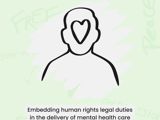Article 2 issues may arise if staff do not take action when they know the life of somebody they are caring for is at risk.
Melanie was 24 years old and voluntarily admitted herself to a mental health hospital after she’d attempted to take her own life. She was assessed as being at high risk of suicide and the doctor advised ward staff that if Melanie asked to leave, she should be re-assessed and if necessary detained under the Mental Health Act to try and protect her right to life. At the weekend, Melanie left the hospital and whilst on leave from the ward took her own life. Her family took a human rights case to court, the court ruled that the hospital had failed in their duty to protect Melanie’s right to life.



